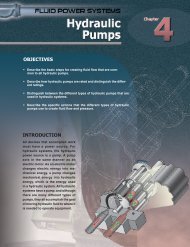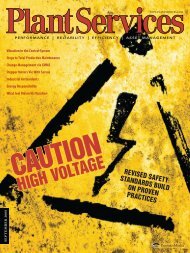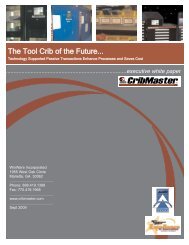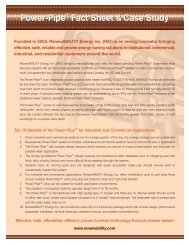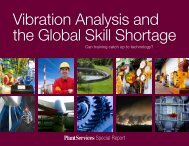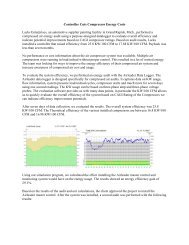POWER UP A WINNER - Plant Services
POWER UP A WINNER - Plant Services
POWER UP A WINNER - Plant Services
Create successful ePaper yourself
Turn your PDF publications into a flip-book with our unique Google optimized e-Paper software.
For the Pacific Northwest<br />
Martin Kagan runs The Capital Asset Exchange Ltd., Beaverton,<br />
Ore., which seeks to be a forum and trading center<br />
for its members. The organization established the Oregon<br />
Trade Expansion Network (OTEN) to act as a clearinghouse<br />
for barter transactions among members. Of course, there’s<br />
a Web site associated with both and I’d like to direct your<br />
attention to a specific page. Head over to www.capex.com to<br />
access the link that takes you to OTEN. Find the link to an<br />
article titled “Trade Economics 101.” Kagan says that it will<br />
help determine whether barter can give you a competitive<br />
advantage in terms of getting new business, selling surplus,<br />
conserving cash or alternative financing. Kagan’s prose is a<br />
bit too abstract for my tastes and the graph that’s supposed<br />
to be on the page is missing, but there’s a message here that<br />
might prove to be of value to your real-world problems.<br />
Funky markets and pricing<br />
Money is a true, indifferent medium of exchange. Going<br />
outside the money economy obscures the value of commodities.<br />
The effect is especially pronounced when extramarket<br />
trading gets regionalized. Fragmented markets make it difficult<br />
to price offerings properly These arguments come from<br />
Gregg Economou, senior systems programmer at Carnegie<br />
Mellon University, who uses the nickname isildur, one of<br />
Tolkien´s characters. The rest of his musings are available for<br />
public inspection at www.vaxpower.org/~isildur, where you<br />
should scroll to the bottom of the page for the link to the<br />
article titled “Towards the new barter economy.”<br />
Worst practices<br />
The Soviet Union disappeared in a puff of smoke because,<br />
among other things, its command-and-control economy<br />
didn’t work very well when the rest of the world was<br />
booming. The profit motive was absent, and greenbacks,<br />
or whatever they call their ruble equivalent, were in short<br />
supply. What’s a good Soviet citizen to do The same thing<br />
that we might be forced to do: Use nonmonetary transactions.<br />
Before you join that game, learn from history to avoid<br />
making the same mistakes as our comrades. To make that<br />
possible, I direct your digital attention to “Explaining rise of<br />
barter in Russia: Virtual Economy vs. Monetary Issues,” an<br />
April 2004, master of science research paper written by Tuvshintulga<br />
Bold at East Carolina University. It examines the<br />
two main schools of thought concerning the collapse of that<br />
economy. It shows how the value applied to something used<br />
for barter can shift an economic burden to one party or the<br />
other. Before you barter, learn how this happens at www.ecu.<br />
edu, where your commissar orders you to enter the author’s<br />
first name in the search box to access the 25-page document.<br />
more resources at www.plantservices.com<br />
TOPic<br />
Online auctions<br />
Entrepreneurialism<br />
Green overview<br />
Industrial recycling<br />
Used equipment<br />
Domestic barter<br />
According to the next Web citation, from the historical<br />
perspective, barter is inefficient because it’s a response<br />
to, and not a remedy for, market adversities and uncertainties.<br />
In her 2003 paper, “U.S. Domestic Barter: An<br />
Empirical Investigation,” Barbara Cresti at the Université<br />
Catholique de Louvain in Belgium explores the the North<br />
American barter industry that came into being during the<br />
1950s. She points out the difference between corporate<br />
and retail barter. You’ll learn how our robust financial<br />
infrastructure explains why barter works here and how its<br />
lack indirectly led to the collapse of the Russian economy.<br />
This scholarly work is at www.uclouvain.be/en-econ.html.<br />
Click “Publications” on the left. Then, click on “Discussion<br />
Papers” and select the “ECON DP 2003” option, also on<br />
the left. Scroll down to select the entry listed as “2003/36”<br />
to read the full report.<br />
Reduce the national deficit<br />
Those who enter the bartering arena can find some deals<br />
that make good economic sense. But you’ll need to keep<br />
track of the details so you can pay taxes on whatever results<br />
when the dust settles on your exchange and, thus, help us<br />
get through this financial downturn. Learn your reporting<br />
obligations by visiting our hired hands working in Washington’s<br />
Internal Revenue Service at www.irs.gov and performing<br />
a search on the word “bartering.” When I searched the<br />
IRS site, I found nearly 300 Web pages that have something<br />
to say about your cashless swap. Maybe you better get your<br />
CFO involved in this matter.<br />
Without comment<br />
www.greatoffers4u.com/articles/3823<br />
www.barter.net<br />
search<br />
“Gatherers versus hunters”<br />
“Don’t quit your day job”<br />
“Growing green plants”<br />
“Second time around”<br />
“More than one kind of green”<br />
For more, search www.<strong>Plant</strong><strong>Services</strong>.com using the<br />
keywords green, exchange and trade.<br />
E-mail Executive Editor Russ Kratowicz, P.E., CMRP, at russk@<br />
putman.net.<br />
www.PLANTSERVICES.com APRIL 2009 43





